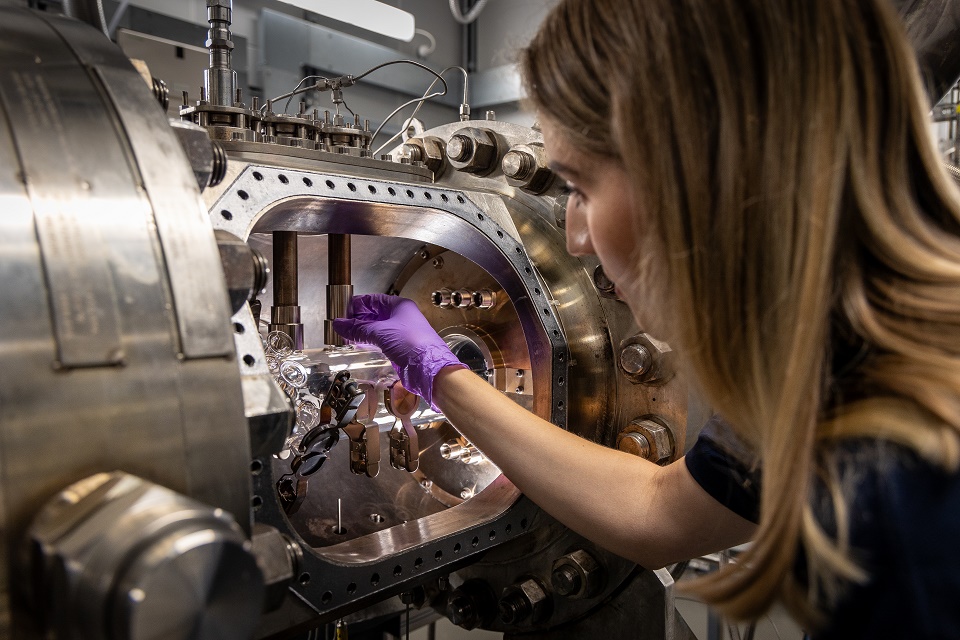Today (Monday 25 September), the company announced achieving a new world industry first as they, alongside easyJet, look to lead in the development of hydrogen combustion engine technology capable of powering a range of aircraft.
Working with Loughborough’s National Centre for Combustion and Aerothermal Technology (NCCAT) and the German Aerospace Centre Deutsches Zentrum für Luft-und Raumfahrt (DLR), Rolls-Royce has proven a critical engine technology that marks a significant step in the journey to enabling hydrogen as an aviation fuel.
Tests on a full annular combustor of a Pearl 700 engine at DLR in Cologne running on 100% hydrogen have proven the fuel can be combusted at conditions that represent maximum take-off thrust.
Key to that achievement has been the successful design of advanced fuel spray nozzles to control the combustion process. This involved overcoming significant engineering challenges as hydrogen burns far hotter and more rapidly than kerosene. The new nozzles were able to control the flame position using a new system that progressively mixes air with the hydrogen to manage the fuel’s reactivity. Rolls-Royce is pleased to confirm that combustor operability and emissions were both in line with expectations.
The individual nozzles were initially tested at intermediate pressure at Loughborough’s recently upgraded NCCAT test facilities and at DLR Cologne before the final full-pressure combustor tests took place at DLR Cologne.
Last year, easyJet and Rolls-Royce also set a world first by successfully running a modern aero engine, an AE2100, on green hydrogen at Boscombe Down, UK.
These recent tests mean the combustion element of the hydrogen programme is now well understood, while work continues on systems to deliver the fuel to the engine and integrate those systems with an engine.
Grazia Vittadini, Chief Technology Rolls-Royce, said: “This is an incredible achievement in a short space of time. Controlling the combustion process is one of the key technology challenges the industry faces in making hydrogen a real aviation fuel of the future. We have achieved that, and it makes us eager to keep moving forward. I want to thank easyJet, Loughborough University and DLR for their dedication and support to reach this milestone.”
Johan Lundgren, CEO of easyJet, said: “We believe hydrogen is the future of short-haul aviation and the success of this test and progress being made demonstrates that this is becoming ever closer. We remain optimistic that it will play a critical role in helping us achieve the ambitious goals we set out in our net zero roadmap.”
Professor Dan Parsons, Pro Vice-Chancellor for Research and Innovation at Loughborough University, said: “In conjunction with its partners, Loughborough’s National Centre for Combustion and Aerothermal Technology is delighted to have supported the landmark testing and development of advanced aerospace fuel spray nozzles utilising hydrogen fuel. This is a major advance towards net zero aviation.”
The technologies tested at Loughborough and DLR will now be incorporated into the learning from the Boscombe Down tests as Rolls-Royce and easyJet prepare for the next stage of testing – a full gas hydrogen ground test on a Pearl engine.
That will in turn lead to a full ground test on a Pearl engine using liquid hydrogen – both easyJet and Rolls-Royce have a shared ambition to then take the technology to flight.
Rolls-Royce receives support for hydrogen research through the UK’s Aerospace Technology Institute HyEST programme, Germany’s LUFO 6 WOTAN programme, and the European Union’s Clean Aviation CAVENDISH programme. Loughborough is a partner in HyEST and CAVENDISH. DLR is a partner in WOTAN and CAVENDISH. easyJet has provided investment to support the development of hydrogen combustion engine technology for narrow-body aircraft.
